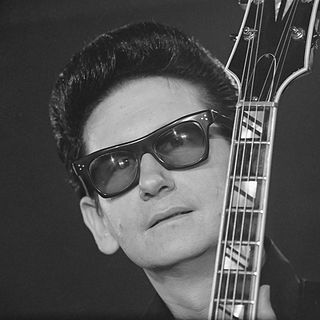
Roy Kelton Orbison was an American singer, songwriter, and guitarist known for his distinctive and powerful voice, complex song structures, and dark, emotional ballads. Orbison's music is mostly in the rock music genre and his most successful periods were in the early 1960s and the late 1980s. He was nicknamed "The Caruso of Rock" and "The Big O". Many of Orbison's songs conveyed vulnerability at a time when most male rock-and-roll performers projected strength. He performed with minimal motion and in black clothes, matching his dyed black hair and dark sunglasses.

Mystery Girl is the twenty-second album by American singer Roy Orbison. It was his last album to be recorded during his lifetime, as he completed the album in November 1988, a month before his death at the age of 52, and it was released posthumously by Virgin Records on January 31, 1989. It includes the hit singles "You Got It", which was co-written by Orbison and his Traveling Wilburys bandmates Jeff Lynne and Tom Petty, and "She's a Mystery to Me", written by Bono and The Edge. The album was a critical and commercial success; it peaked at number 5 on the Billboard 200 in the United States, the highest position Orbison had achieved on that chart, and number 2 on the UK Albums Chart.
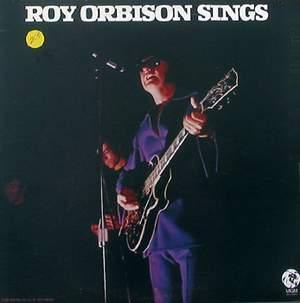
Roy Orbison Sings is the sixteenth album recorded by Roy Orbison and the ninth for MGM Records, released in May 1972. Around this time, Orbison's hit singles had well and truly dried up, but this album is said to be one of his finest.
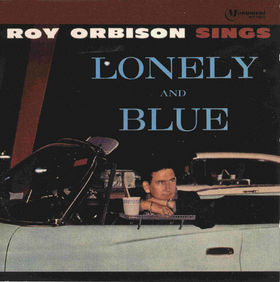
Lonely and Blue is the debut studio album by Roy Orbison, released on Monument Records in January 1961.

Hank Williams: The Roy Orbison Way is the fourteenth album recorded by Roy Orbison, and his eighth with MGM Records, released in August 1970. It is a tribute album to the songs of honky tonk singer Hank Williams, whom Orbison listed among his influences. The album was a critical failure and it sold poorly—Fred Foster said it was "an exercise in futility." The exclusively North America release remained relatively unknown to Orbison fans until it was repackaged on Compact Disc in 2009 along with the popular 1967 Don Gibson tribute album Roy Orbison Sings Don Gibson. The album was also included in the 2015 box set The MGM Years 1965–1973 – Roy Orbison.
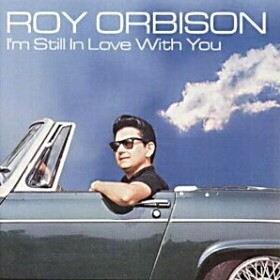
I'm Still in Love with You is the nineteenth album by Roy Orbison, recorded for Mercury Records and according to the authorised biography of Roy Orbison, released in September 1975.

"Blue Bayou" is a song written by Roy Orbison and Joe Melson. It was originally sung and recorded by Orbison, who had an international hit with his version in 1963. It later became Linda Ronstadt's signature song, with which she scored a Top 5 hit with her cover in 1977. Many others have since recorded the song.

"In Dreams" is a song composed and sung by singer Roy Orbison. An operatic rock ballad of lost love, it was released as a single on Monument Records in February 1963. It became the title track of the album In Dreams, released in July of the same year. The song has a unique through-composed structure in seven movements in which Orbison sings through two octaves, beyond the range of most rock singers.
"Love Hurts" is a song written and composed by the American songwriter Boudleaux Bryant. First recorded by the Everly Brothers in July 1960, the song is most well known in two hit versions by UK artists; by Scottish hard rock band Nazareth in 1974 and by English singer-songwriter Jim Capaldi in 1975.
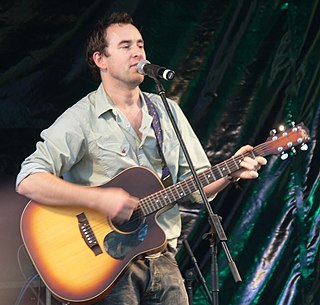
Damien Leo Leith is an Irish-Australian singer–songwriter. He was the winner of the Network Ten music contest Australian Idol in 2006. Since winning the title, Leith has released nine studio albums, four of which peaked in the top two of the ARIA Charts, including two number ones. He has been awarded seven platinum and one gold certification for albums and singles by ARIA, which equates to sales of just over half a million.

The Johnny Cash Show is an American television music variety show that was hosted by Johnny Cash. The Screen Gems 58-episode series ran from June 7, 1969, to March 31, 1971, on ABC; it was taped at the Ryman Auditorium in Nashville, Tennessee. The show reached No. 17 in the Nielsen ratings in 1970.

The Essential Glen Campbell Volume Three is the third of a series of three albums which cover Glen Campbell's recordings for Capitol Records from 1962-79. The tracks are presented in a non-chronological order. All three Essential CDs contain, next to single and albums tracks, previously unreleased recordings. On The Essential Glen Campbell Volume Three, these are "Beautiful Brown Eyes", "They'll Never Take Her Love from Me", "All the Way" and "Learnin' the Blues". The last two songs are from a 1979 recording session led by Nelson Riddle. The Essential albums are also notable for containing some of the songs from The Artistry of Glen Campbell, the only original studio album by Campbell that has not been released on CD or as a digital download. Included here is "Tequila".
"Let the Good Times Roll" is a song that was recorded by Shirley and Lee in 1956. This song was written by the duo, Shirley Goodman and Leonard Lee.
Attic Lights are a Scottish indie rock band from Glasgow, Scotland, formed in 2005 by Kev Sherry, Colin McArdle and Jamie Houston, later joined by Tim Davidson and Noel O'Donnell. The four-part harmonies in a number of their songs have led to critical comparisons with Teenage Fanclub and The Beach Boys. Their guitar heavy powerpop has been compared to alternative rock bands such as Weezer, R.E.M. and The Lemonheads.
"Tryin' to Get to You" is a song written by R&B singer songwriters Rose Marie McCoy and Charles Singleton. It was originally recorded by the Washington DC vocal group The Eagles in 1954 and released in mid-1954 on Mercury Records 70391. The format of the title on The Eagles’ record was “Tryin’ to Get to You”, with an apostrophe.

Greatest Hits - Live is an album by American singer-songwriter Don McLean, released in 1997.

Alexander Orbison, also known as Orbi, is an American drummer, writer, director, and film producer. He is the president of Still Working Music Group, a publishing company. He is also president and co-founder of Roy's Boys LLC, which manages the legacy of his father, musician Roy Orbison; the organization also includes his brothers, Roy Orbison Jr. and Wesley Orbison.
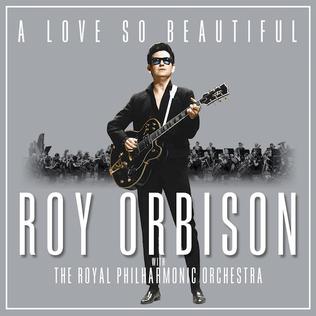
A Love So Beautiful is a compilation album by American singer Roy Orbison. It was released on November 3, 2017 by Roy's Boys, Monument, Legacy, Sony. The album features archival vocal recordings of Orbison accompanied by new orchestral arrangements by the Royal Philharmonic Orchestra. It also features a duet with English country duo Ward Thomas.

"Candy Man" is a song by Roy Orbison, released as the B-side to his international hit "Crying" in July 1961. It was later covered by British beat group Brian Poole and the Tremeloes, becoming a top-ten hit in the UK.














